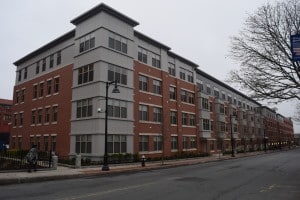
Trinity Financial is the lead developer for the Enterprise Center, a Main Street block formerly occupied by the Brockton Enterprise newspaper.
Mixed-income housing has been a growing trend in real estate over the past decade, spurred both by developers looking to set their proposal apart and by community demand for more financially diverse housing options.
In Gateway Cities throughout Massachusetts, mixed-income housing has proven to be an impetus for both economic and cultural growth. But the process for building these mixed-income developments is easier said than done, and is not as simple as layering affordable units into a new market-rate development.
These types of projects require combining strategic location selection, intricate financing and sound community planning to provide cities with a catalyst for growth. Selecting the right community requires having a knowledge of the city’s history, but also a firm understanding of where that city is looking to grow. So what should developers look for when deciding whether or not to make a mixed-income investment in a Gateway City?
When it comes to locale, developers must understand the local market conditions and have a true read on the community landscape. When Trinity Financial first looked at Brockton as a location to invest in, the city was at the beginning of its renaissance. Elected officials and stakeholders expressed a need for more market-rate housing, fearing that developing exclusively affordable units would prevent the type of economic development necessary to stimulate Brockton’s emerging downtown. The support of the community was instrumental in Trinity’s decision to invest, supporting the narrative that Brockton would be a smart site to develop mixed-income housing in. With that in mind, Trinity zeroed in on redeveloping and restoring the historic Enterprise Center. Within walking distance of downtown Brockton’s commuter rail station and the city’s center, the transit-oriented location of the Enterprise Center made it an appealing destination for housing.
Multiple Layers Of Financing Needed
Developing mixed-income housing at Enterprise Center also required complicated financial structuring. The project, which will consist of two phases of housing and commercial development (the first of which was completed in 2015, and the second of which will be completed in 2019), includes the historic rehabilitation of an existing commercial building and the construction of a new parking garage. The project will be funded using historic tax credits, low-income housing tax credits, New Markets tax credits, private debt and equity and other public resources. The project is designed to comply with the goals of the Downtown Brockton Smart Growth Overlay District (DBSGOD) and was permitted using the commonwealth’s 40R permitting process.
As complex as the funding may be to develop mixed-income housing in Brockton, it is essential that we work together with the city and all of our financial partners to pull together these intricate financing models in order to make providing new housing opportunities available to residents of all financial backgrounds a reality.
Trinity completed phase one of the Enterprise Center in 2015, creating 113 total housing units, including 42 market rate, 29 affordable and 42 artist preference units. Along with 52,000 square feet of commercial/office space, 10,000 square feet of retail and artist exhibition space, 95 residential parking garage spaces and 185 surface parking lot spaces, we look forward to continuing our work in Brockton and moving forward with phase two in 2017.
Mixed-income housing investments in Gateway Cities like Brockton have the potential to revitalize neighborhoods and encourage diversity and integration. In order to be successful in Brockton, we rely on open communication with the community and our partners. As we look toward the future, it’s more important than ever to capitalize on these opportunities to ensure that development benefits all residents- and mixed-income housing is an excellent means of making that happen.
Kenan Bigby is a managing director at Trinity Financial.




 |
| 




